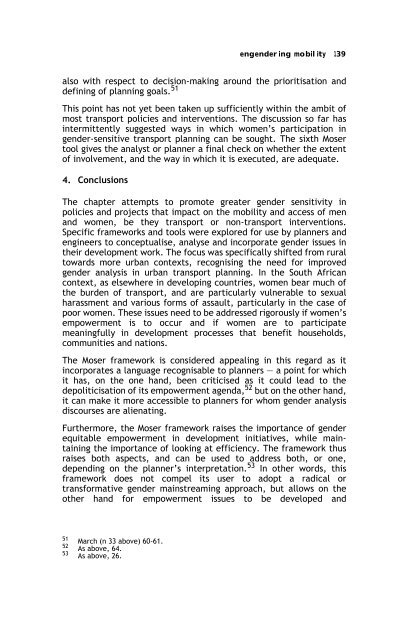Sex, Gender, Becoming - PULP
Sex, Gender, Becoming - PULP
Sex, Gender, Becoming - PULP
Create successful ePaper yourself
Turn your PDF publications into a flip-book with our unique Google optimized e-Paper software.
engendering mobility 139<br />
also with respect to decision-making around the prioritisation and<br />
defining of planning goals. 51<br />
This point has not yet been taken up sufficiently within the ambit of<br />
most transport policies and interventions. The discussion so far has<br />
intermittently suggested ways in which women’s participation in<br />
gender-sensitive transport planning can be sought. The sixth Moser<br />
tool gives the analyst or planner a final check on whether the extent<br />
of involvement, and the way in which it is executed, are adequate.<br />
4. Conclusions<br />
The chapter attempts to promote greater gender sensitivity in<br />
policies and projects that impact on the mobility and access of men<br />
and women, be they transport or non-transport interventions.<br />
Specific frameworks and tools were explored for use by planners and<br />
engineers to conceptualise, analyse and incorporate gender issues in<br />
their development work. The focus was specifically shifted from rural<br />
towards more urban contexts, recognising the need for improved<br />
gender analysis in urban transport planning. In the South African<br />
context, as elsewhere in developing countries, women bear much of<br />
the burden of transport, and are particularly vulnerable to sexual<br />
harassment and various forms of assault, particularly in the case of<br />
poor women. These issues need to be addressed rigorously if women’s<br />
empowerment is to occur and if women are to participate<br />
meaningfully in development processes that benefit households,<br />
communities and nations.<br />
The Moser framework is considered appealing in this regard as it<br />
incorporates a language recognisable to planners — a point for which<br />
it has, on the one hand, been criticised as it could lead to the<br />
depoliticisation of its empowerment agenda, 52 but on the other hand,<br />
it can make it more accessible to planners for whom gender analysis<br />
discourses are alienating.<br />
Furthermore, the Moser framework raises the importance of gender<br />
equitable empowerment in development initiatives, while maintaining<br />
the importance of looking at efficiency. The framework thus<br />
raises both aspects, and can be used to address both, or one,<br />
depending on the planner’s interpretation. 53 In other words, this<br />
framework does not compel its user to adopt a radical or<br />
transformative gender mainstreaming approach, but allows on the<br />
other hand for empowerment issues to be developed and<br />
51 March (n 33 above) 60-61.<br />
52<br />
As above, 64.<br />
53 As above, 26.
















